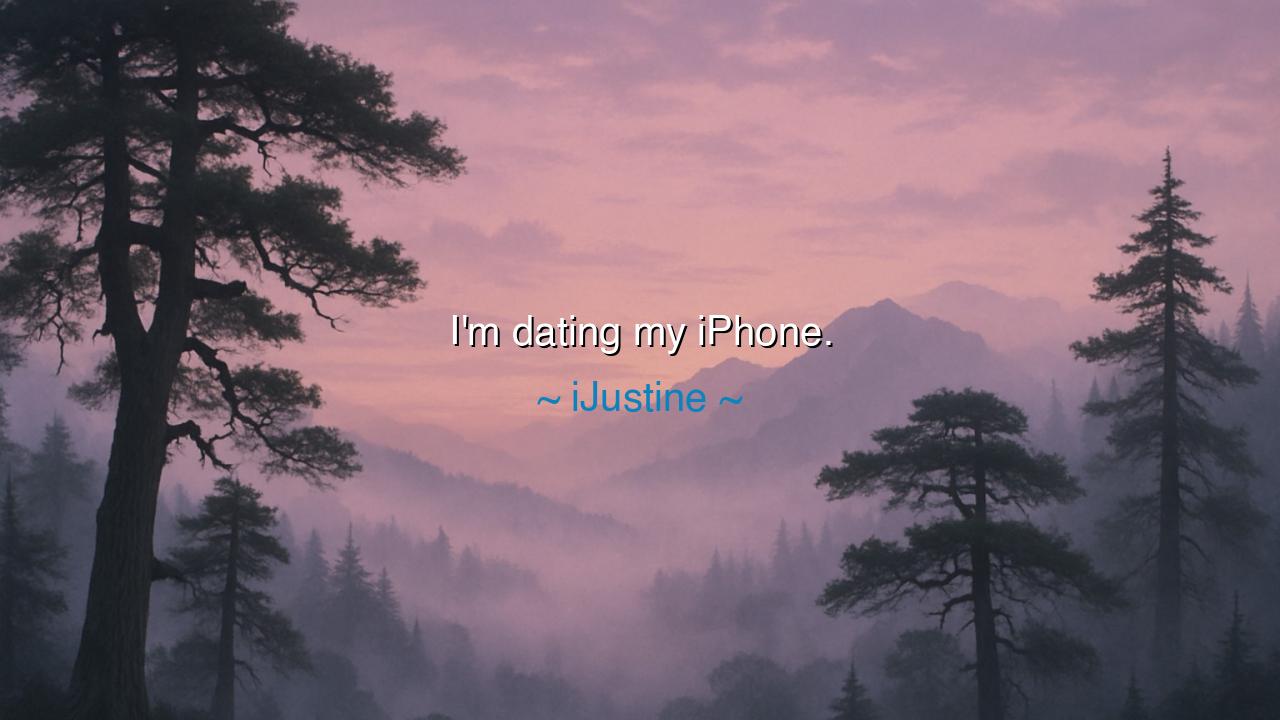
I'm dating my iPhone.






In the words of iJustine, “I’m dating my iPhone.” — what seems, at first glance, a jest of modern humor, conceals beneath its lightness a profound reflection on the human spirit in the age of technology. These few words, sharp and playful, reveal the transformation of our age: an age in which affection, attention, and even intimacy have been intertwined with the machines we have created. What was once a tool to serve humanity has, in many ways, become our companion — our mirror, our confidant, our constant presence. Beneath the laughter of her remark lies a quiet truth: that in binding ourselves to our devices, we are reimagining what it means to connect, to feel, and to love.
The origin of this quote lies in a time when the iPhone — a device of infinite convenience and charm — had become not merely a possession, but a symbol of modern life itself. iJustine, a pioneer of the digital world, was among the first to fully live her life in the light of the screen — a woman who spoke, worked, laughed, and shared her very being through the glass window of technology. Her words were spoken half in jest, yet like all great truths, they carried more weight than they first appeared to. To say “I’m dating my iPhone” was to confess the reality of a new world: one where people turn to machines for connection, where affection is expressed in taps and messages, and where silence feels unbearable without the hum of a device nearby.
The ancients would have regarded this phenomenon with awe — and perhaps with fear. For they understood that every invention, though born of the human hand, possesses the power to shape the human soul. In the myth of Pygmalion, the sculptor falls in love with his own creation, Galatea, a statue so lifelike that he mistakes art for being. The gods, moved by his devotion, bring the statue to life — and thus love crosses the boundary between the created and the creator. So too, in our modern myth, humanity has breathed life into its own creation — not of marble, but of circuits and glass. We cradle our devices as Pygmalion cradled Galatea, seeking reflection, affirmation, and meaning within them.
Yet, unlike Pygmalion’s dream, our machines do not love us back — they merely simulate affection. They respond without judgment, obey without hesitation, and never leave us alone — and therein lies their dangerous sweetness. The bond between human and technology can become a mirror of isolation, where connection feels constant but remains hollow. The one who says, “I’m dating my iPhone,” does not only jest about attachment — they warn, perhaps unknowingly, of loneliness disguised as companionship. For while the screen connects us to many, it also separates us from the touch, the gaze, the laughter that can only be found in the living presence of another soul.
Still, there is no condemnation in these words — only observation. For technology, like fire in the hands of the ancients, is neither good nor evil by nature; it is power, and its morality is born from how we wield it. The wise must learn balance — to embrace the gifts of innovation without surrendering the essence of humanity. iJustine, as both a daughter of the digital age and a witness to its power, speaks as one who understands the seduction of constant connection. To “date” one’s iPhone is to acknowledge how deeply technology has intertwined with our emotions, habits, and identities. It is to stand in the mirror of progress and see both light and shadow.
Consider the story of Narcissus, who fell in love with his reflection upon the still water. His image captivated him so completely that he could not look away — until his obsession led to his demise. The myth is ancient, but its reflection is modern. Our screens, too, have become the pools in which we gaze — pools that show us ourselves, filtered and perfected, yet never real. The lesson is the same: love what you see, but remember to lift your eyes from the reflection. For the world beyond the glass is where true life and true connection dwell.
So, what shall we learn from iJustine’s seemingly playful confession? It is this: that we must awaken to our attachments. Technology may accompany us, but it must never possess us. Use it to connect, but not to replace connection; to learn, but not to escape thought; to create, but not to forget wonder. Let the device be your servant, not your master. For the greatest power of humanity has always been not in what it builds, but in its ability to remain human amid its creations.
Thus, the next time your hand reaches for the glowing screen, remember the spirit behind her words. The iPhone, or any device, is but a reflection of our longing — for love, for presence, for meaning. But these things, the ancients would remind us, can only be truly found in the living heart of another being, not in the circuits of a machine. Let us, then, carry the wisdom of this modern age with humility: to live alongside our technology without becoming one with it. For love, real love, cannot be downloaded — it must be lived, breathed, and shared beyond the screen.






AAdministratorAdministrator
Welcome, honored guests. Please leave a comment, we will respond soon